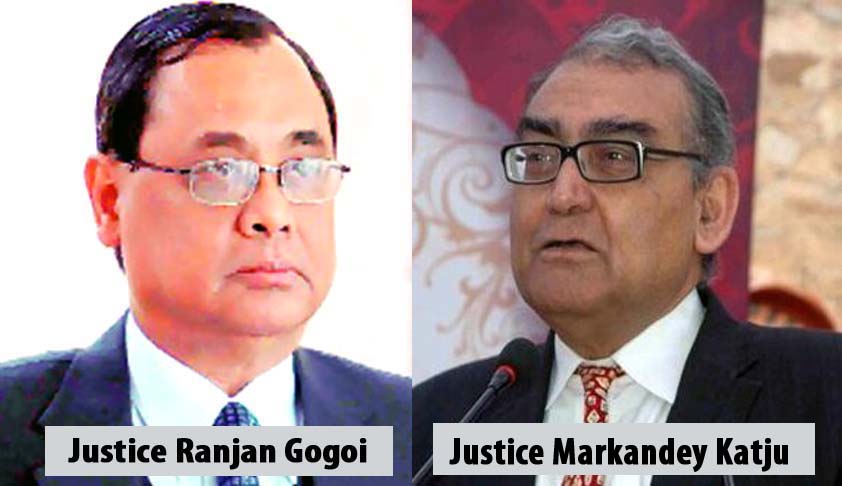The Curious Case Of Criticism, Conflict & Contempt
Namit Saxena
15 Nov 2016 5:31 PM IST

Friday’s hearing in Courtroom No. 6 of the Supreme Court displayed a series of interesting events reverberating with judicial thunder when the Supreme Court issued contempt notice to a retired yet vocal veteran of the same court. In my previous post, I had written about as to why in my view the Justice Katju calling order was violative of Article 124(7) and the only provision permitting the Court to do so was Section 32 of the Advocates Act, 1961.
In a nutshell, the Supreme Court’s bench speaking through Justices Gogoi, Pant &Lalit had requested Justice Katju in review petitions filed by the State and deceased girl’s mother after hearing the Attorney General and Siddarth Luthra on merits, to appear in person before it and participate in the proceedings to debate upon whether the Judgement passed by the bench suffered from any fundamental flaw. After the hearing, the Supreme Court converted it into a suomotu criminal review petition on the Blog written by Justice Katju criticizing the judgment. The case was consequently numbered as a Suo Motu Review (SMR) petition titled as In Re blog published by Justice Markandey Katju in Facebook. The bench on friday allowed Justice Katju to argue on merits and gave him an hour to represent his case. Justice Katju finished his arguments and the Review petition was dismissed. Justice Gogoi took out 2 blogs written by Justice Katju and asked if he had authored the contents therein, on his nod and after the Attorney General called it scandalous and later intemperate, the bench issued contempt notice to Justice Katju.
Among so many interesting questions this curious case has created, the chief are; Whether the previous order of the court breached Article 124(7), Whether Article 129 has supremacy over Article 19(1)(a)and Whether what Justice Katju wrote was a scurrilous attack intended to scandalise the court and can he be held liable for contempt.
In my previous article, I had opined that the order breached the mandate in Article 124(7) and that in fact the article created a surrounding of immunity for retired Supreme Court judges. Coming to the second question; Article 19(1)(a) gives every citizen the freedom of speech and expression which can be reasonably restricted by the state by enacting a suitable legislation for 8 reasons including contempt of court. Further, Article 129 grants a power to the Supreme Court to punish for contempt of itself. Section 2(c) of the Contempt of Courts Act, 1971 defines criminal contempt to mean and include publication of any matter which scandalises or tends to scandalise, or lowers or tends to lower the authority of any court.A 2006 amendment to the Contempt of Courts Act, 1971 clarifies that the Court may impose punishment for contempt only when it is satisfied that substantially interferes, or tends to substantially interfere with the due course of justice. It is trite law that Article 19(1)(a) is subject to Articles 19(2) and 129(Dr D.C.Saxena v CJI – 1996 5 SCC 216).As written in the last article as well, Contempt of Court was a later addition in Article 19(2).There are plethora of cases dealing with the subject of fair criticism, power of Supreme Court to punish for contempt and permissible use of contemptuous language.However, here I make an attempt to dwell into whether what Justice Katju wrote, wrote and wrote was scandalous in nature.
Alexander Hamilton in Federalist Papers pointed out that the weakest or the least dangerous branch of the Government was Judiciary as they depend upon voluntary compliance and can’t generally compel obedience. Justice Robert Jackson famously wrote - “There is no doubt that if there were a super-Supreme Court, a substantial proportion of our reversals of state courts would also be reversed. We are not final because we are infallible, but we are infallible only because we are final.” The width and scope of Supreme Court’s power on contempt can be seen from the SEBI-Sahara saga wherein for disobeying Court’s Order a massive penalty of Rs 10,000/- Crore was crafted for bailing him out. The Writ petition filed against this order was dismissed as not maintainable as the Supreme Court cannot issue a writ to itself under Article 32.In the present case, however, if one reads what Justice Katju wrote in the two blogs criticizing the Saumya Rape-Murder judgment, there is nothing scandalous enough so as to constitute the offence of criminal contempt. It is his view that the judgment suffers from grave error and the accused should have been convicted for murder, the bench disagreed and dismissed the review. However, commenting upon intellectual level of judges and specifically Justice Gogoi, who in the order has extended that comment to other 2 members of the bench as well, may not be totally correct for a retired judge to say, if not scandalous prima facie.
In my view, firstly, the Supreme Court ought to have refrained from asking justice Katju to come in person and participate in the proceedings. Secondly, there is absolutely nothing in the blog criticizing the judgment for which Justice Katju may be tried for criminal contempt of the Court but the other blog commenting upon intellectual level of judges and specific comment on Justice Gogoi cannot be termed as correct.The Supreme Court need not be over sensitive and must look out of the window to have a bigger picture on one hand, whereas on the other hand, it must make sure that the dignity of the institution remains intact and the prestige our judiciary has earned does not gets flushed away aby anybody, be it a retired Supreme Court Judge. In a classic case of conflict, I hope law prevails. Nevertheless, Justice Katju has 6 weeks to reply. Curiosity continues and the beat goes on! Fingers crossed!
 Namit Saxena is a Lawyer practicing in the Supreme Court of India.
Namit Saxena is a Lawyer practicing in the Supreme Court of India.
[The opinions expressed in this article are the personal opinions of the author. The facts and opinions appearing in the article do not reflect the views of LiveLaw and LiveLaw does not assume any responsibility or liability for the same]
This article has been made possible because of financial support from Independent and Public-Spirited Media Foundation.


